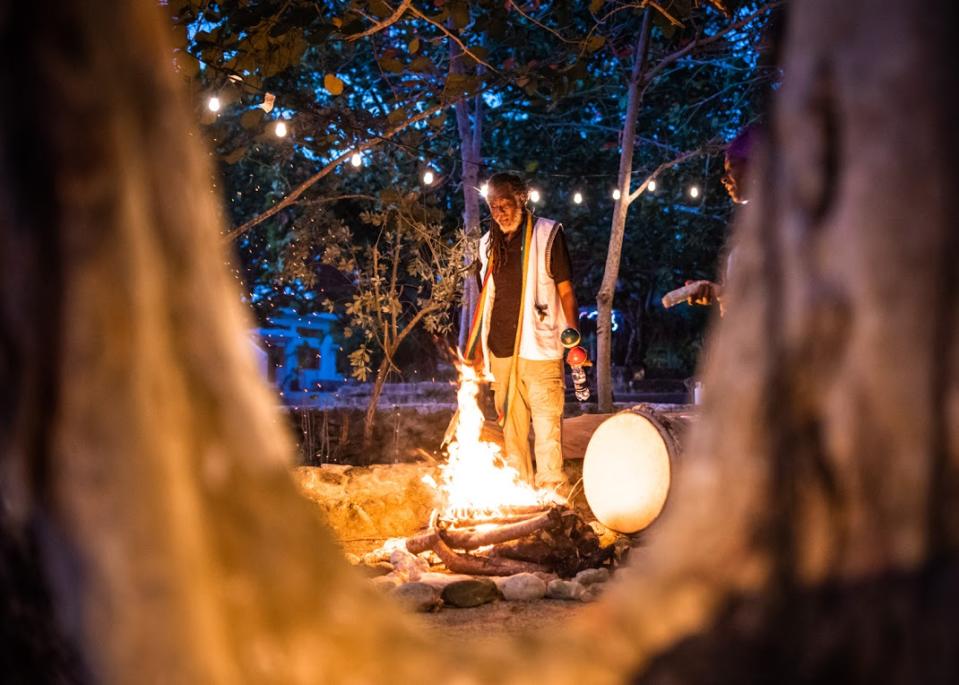Inside the Growing Wellness Trend of Psilocybin Mushroom Microdosing

Over the past few years, the acceptance of microdosing psychedelic fungi as a medical treatment has grown slowly but steadily — in mainstream American media, in official laboratories, among some politicians and even in homes.
Microdosing psychedelics is a practice that involves taking generally one-tenth of a standard “trip” dose (by capsule, dropper or nasal spray), so that one’s senses aren’t affected to the point of full hallucination, but perception sharpens and serotonin is increased. Documentaries and TV series like Netflix’s Fantastic Fungi and Hulu’s Nine Perfect Strangers have helped set the stage for a more open mushroom conversation; they both demystify and explore the healing power of the spore-bearing, soil-bound fungus.
More from The Hollywood Reporter
'Nine Perfect Strangers' Cast on Getting "Lucky" With Eclectic Ensemble
Melissa McCarthy Reveals Story Behind Viral Mariska Hargitay Roadside Moment
In 2022, in California, State Sen. Scott Wiener is hoping to pass a bill, Senate Bill 519, that would allow the possession and sharing of some hallucinogenic substances — including magic mushrooms, MDMA, ketamine and LSD, but would not permit the selling of those drugs. (In Oregon, the Oregon Psychiatric Physician’s Association opposed legalization because psilocybin is not FDA approved and clinical trials are still ongoing.)
And much like cannabis’ transition from stigmatized plant to decriminalized cash cow, today’s wellness industry is now embracing mushrooms as another form of nature’s medicine by putting real capital and academic research behind it. A small Johns Hopkins study, for instance, found in 2020 that psilocybin treatments helped relieve symptoms of severe depression.
“What we have access to are medicines that have been used, tried and tested for thousands of years, albeit through Indigenous communities,” says Douglas K. Gordon, CEO of Silo Wellness, a legal psychedelic and functional mushroom company founded in 2018 in Oregon (the only U.S. state to legalize psychedelic mushrooms). Silo hosts weeklong retreats (from $3,195) in Jamaica (where psilocybin has never been illegal) allowing clients to experience the benefits of psychedelics in a controlled environment.

Silo Wellness
Part of Silo Wellness’s mission is to incorporate traditional wisdom and rituals surrounding psychedelics and share them with people in a safe and ethical way. Explains Silo’s chief science adviser Dr. Parag Bhatt, a neuropharmacologist and cognitive neuroscientist and intake coordinator for Silo’s retreats, “For microdosing, it’s sub-perceptual; we’re talking about a non-psychedelic event, where you’re not seeing the hallucinations. What you’re getting is mostly a turning up of the lights and opening of the mind.” Bhatt adds that psychedelics “have a chemical structure that mimics that of serotonin.” (With the family of Bob Marley, Silo also launched Marley One, a product line of tinctures made with non-hallucinogenic mushrooms such as lion’s mane, purported to have health benefits.)
According to Dr. Bhatt, people decide to microdose for a range of reasons: “You have your Type As that want that edge and want to stay on top of things, you have individuals that are trying to maintain their mental health, and you have individuals who are just trying to see if they can expand their mind.”
In behavioral modification therapy, adding psychedelics to a therapeutic regimen is said to help lower cognitive barriers that individuals dealing with things like anxiety and depression maintain throughout treatment — and lowering those thresholds helps to redistribute blood flow in the brain, which allows for it to flow away from “high emotional impact zones,” says Bhatt.
Another company, L.A.-based Celia Collective, offers psychedelic education and customized wellness programs for people interested in healing through micro-dosing (starting at $300 a session). After dabbling in the microdose space for a decade as a form of medicine, Celia Collective’s founder (who prefers to remain anonymous) built a program around her approach to mental, physical and spiritual healing; she shares resources and information on microdosing protocol and products on the market, creates full nutrition programs, leads mindfulness workshops and hosts private dinner parties that integrate ingredients like mushrooms with adaptogenic properties (meaning substances thought to decrease sensitivity to stressors) into the meal.
Her clients participate in a two-week trial to determine what their needs are and comfort level with mushrooms is, and then after a debrief call, they have a month-long integration program, followed by a regenerative one-month process, and another month of manifesting and visualizing under the influence of mushrooms. To date, she has had roughly 200 clients and takes up to 10 new ones per week, all largely referred to her by word of mouth. “The plant does the work for you, I’m just holding people while they do the work,” she says. (At Celia Collective, mushroom products are not produced or sold; the founder has a network of brands and vendors to whom she connects clients.)
“The name of the company really comes from the Native American side of it; it started with these women that really were the nurturers of their community in Peru and fought for psychedelic healing,” she says. “I did a brainstorm with a couple people that do a lot of ceremonial work. And every single person came up with Celia, who is like the grandmother of psychedelic healing — and all things — from a Native American tribe, taking care of everyone. And then the other part is that “celia” is also part of the mycelium of the mushroom world, which is the interconnected web that’s underneath the earth that connects all the trees so they don’t grow on each other — and makes sure that the soil is regenerated.”
Aya Allison, founder and CEO of psychoactive research company Sunset Biosciences, adds that she sees the allure of psychedelics as being about “connection to the heart, period. It’s been seriously lacking. And that’s the thing that I feel like ancient cultures [understood] — the heart is about coherence.”
A version of this story first appeared in the Jan. 19 issue of The Hollywood Reporter magazine. Click here to subscribe.

